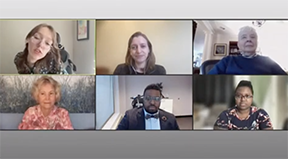
AccessComputing Co-PI Sheryl Burgstahler recently worked on one of the National Academies of Sciences, Engineering, and Medicine's ad hoc planning committees to arrange and hold a series of talks about best practices for enhancing accessibility for individuals with disabilities in fields that do field and laboratory research. The following topics were discussed:
- Framing the discourse (for example, which disability should be the focus of these first discussions? What are the experiences of persons with various forms of impairments when it comes to field and laboratory work? What has changed since the epidemic of COVID-19? What are some of the most prevalent issues?)
- Eliminating barriers to full involvement in field and laboratory research by individuals with impairments;
- Accommodations that are most promising for expanding accessibility include, but are not limited to, assistive devices, assistance, or adjustment of responsibilities;
- Commonalities and variations among options for field and laboratory work that handle accessibility challenges;
- Individually successful approaches are being scaled up into a generalizable practice;
- Mentoring or other support networks have the potential to improve the inclusion of persons with disabilities; and
- Leading practices for accessibility and inclusion in field and laboratory science need institutional policies and cultural changes to be sustained.
Watch the webinars, as well as keynote talks featuring the experts leading each conversation, at each of the links below:
Leading Practices for Improving Accessibility and Inclusion in Field and Laboratory Science: A Conversation Series (Conversation # 1)
December 16, 2021
The first discussion in the series will cover the history and depiction of disabled experiences in STEMM, as well as the confluence of racism and ableism in science and research, as well as significant insights into how intersectionality might be handled in STEMM. A panel of professors and leaders from the disability community will participate in a live webcast discussion on these subjects. Our speakers will address important community issues such as how to move from diversity to genuine equity in educational and research settings. How can we provide personal and institutional assistance to persons who have many marginalized identities? What can we learn about other oppressed groups through research and practice that may be used to inform future research?
Leading Practices for Improving Accessibility and Inclusion in Field and Laboratory Science: A Conversation Series (Conversation # 2)
January 25, 2022
The second discussion in the series will focus on particular areas of access and inclusion in STEMM laboratory research and instruction, including best practices for creating accessible and inclusive lab settings. A panel of professors and leaders from the disability community will participate in a live webcast discussion on these subjects. Our speakers will address important concerns for the community, such as what universal design looks like in a lab setting and what creative technologies are being developed to improve accessibility. How can individuals be proactive in creating accessible and inclusive lab settings, including the infrastructure, technologies, and cultural transformations that are required to enable these changes?
Leading Practices for Improving Accessibility and Inclusion in Field and Laboratory Science: A Conversation Series (Conversation # 3)
February 10, 2022
The third discussion in the series will focus on particular issues of access and inclusion for STEM field-based research and teaching, such as best practices, misunderstandings, and impediments to building accessible and inclusive fieldwork. A panel of professors and leaders from the disability community will participate in a live webcast discussion on these subjects. Our panelists will address important issues such as: How can we make it safer for people to disclose disabilities or request field trip accommodations? What illusions about fieldwork need to be busted in order to alter the field-based education and research culture to be more inclusive? What new tools, technology, and innovative ways are available to execute accessible and inclusive fieldwork?
The fourth dialogue in the series will focus on specific elements of computational-based research and teaching in STEMM, with a particular emphasis on access and inclusivity. A panel of professors and leaders from the disability community will participate in a live webcast discussion on these subjects. Our panelists will address important issues such as: What is the relationship between human-computer interaction and computational accessibility and inclusion? What new computational-based techniques, tools, and technologies may be used to broaden STEMM access and participation? How can we apply universal design principles to our computational work?
The series' concluding talk will integrate our prior discussions to emphasize accessibility and inclusion in STEMM across the whole career pipeline of a handicapped scientist, including the necessity and function of mentorship. A panel of professors and leaders from the disability community will participate in a live webcast discussion on these subjects. Our speakers will address important issues such as: What accessibility and inclusivity enhancements are needed from undergraduate education through tenure or a scientist's long-term research career? What institutional, cultural, and economic policy reforms are required to make STEMM more accessible and inclusive for handicapped scientists? What role does mentorship play in increasing STEMM access and inclusion?